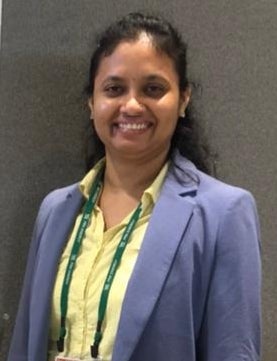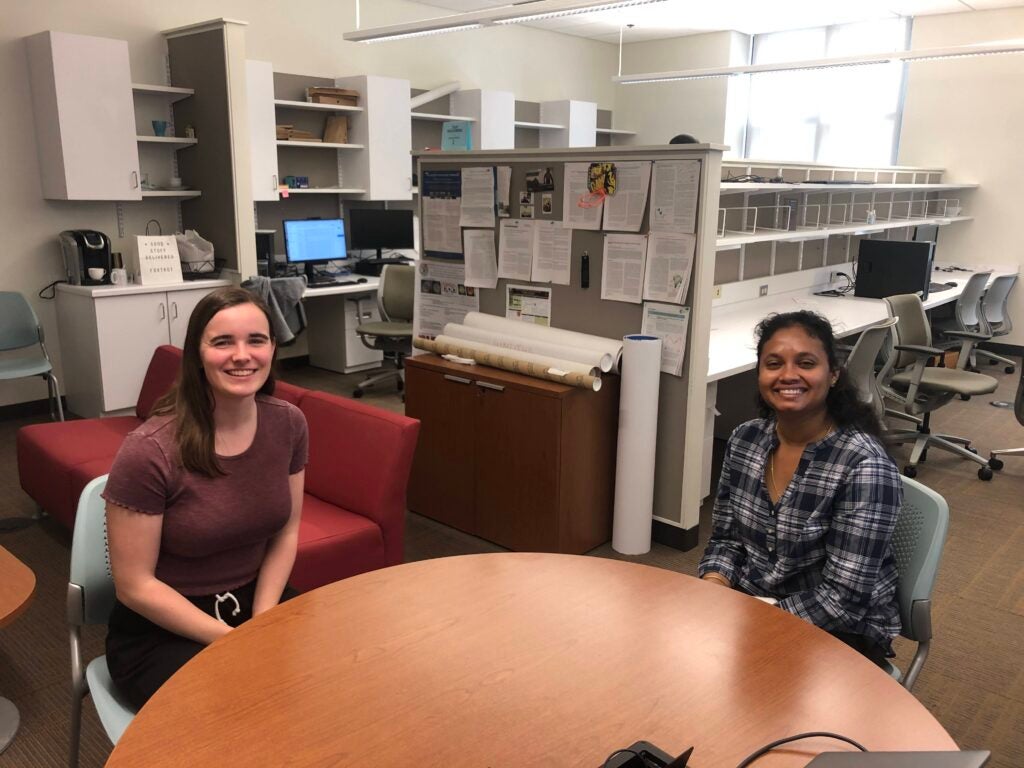Dr. Vinutha H.A.

Dr. Vinutha H.A. is a postdoctoral fellow working with Professor Emanuela Del Gado. She has a PhD in physics, with a focus in soft condensed matter, looking at granular materials and doing mainly computational work (i.e., computer simulations/experiments). Her background is in statistical mechanics and how we think about problems of how to analyze and understand microscopic behavior. Granular systems are interesting because they can exist in all three different states of matter, so statistical mechanics is useful to understand the dynamics of the interplay between the different states.
Vinutha’s interest in soft matter physics began during her Masters in India, where doing tabletop experiments with granular materials used as a time unit demonstrated some interesting behavior and properties that couldn’t be explained, leading her to want to learn more about those kinds of systems.
While doing her first postdoc at Cambridge, Vinutha looked at nonequilibrium glasses and computing free energies for glass systems. Free energies are an equilibrium property, useful for telling if a system is stable, but glasses are disordered solids that are out of equilibrium. Developing techniques to figure out the solubility of a disordered system without thermodynamics posed an interesting problem and is an important issue for industries that rely on that type of information, such as pharmaceuticals.
From there, Vinutha started looking at problems relating to fragmentation and grinding, which consumes a lot of energy and poses a significant issue with the current climate crisis. Her work aimed to understand how the energy division happens in nonequilibrium systems and where the energy goes.
Currently at Georgetown, Vinutha transitioned to what she considers some of her most interesting research: looking at the rheology of soft solids, a new challenge for her. She is trying to understand how to model the flowing behavior of granular systems on a computer, and how they come to rest, studying how to understand and predict the microscopic dynamics of those systems.

Vinutha decided to join Georgetown because she was interested applying her experience and understanding at the fundamental level in physics to problems that are relevant in society, and she admired Prof. Emmanuela Del Gado’s ability to do that with her research in cement. Since physics can be harder than other sciences to go from a microscopic understanding to approaching real problems, Vinutha is still figuring out how to make a contribution on a broader real-world scale, but she feels a lot more confident working towards that goal under Prof. Del Gado.
When asked about where Vinutha sees herself going next and her goals moving forward, she said she definitely sees herself continuing to research because it keeps her engaged. However, going forward in research, she would like to incorporate more experimental research in addition to computer modeling because granular systems can be easy to work with and see. She would also like to bridge the gap between researchers and engineers to connect her research to more real-world problems like the carbon footprint of working with cement. Additionally, she would like to be able to teach eventually, as a big part of her initial draw to and enthusiasm for physics came from having good teachers, and she would like to pay it forward.
Vinutha enjoys research because she says it’s like being a detective, since you’re given a problem and must figure out all the clues to answer a question. She enjoys the process of finding that answer, and it makes her work interesting every day, because she says if you ask an interesting question, the answer will always be interesting. She also enjoys research and the soft matter community because she gets to interact with different people and meet interesting people from different backgrounds.
When asked if she has any advice for young scientists, Vinutha encouraged everyone to join research (specifically soft matter!) Especially if you are someone who likes detective stories, figuring out problems for yourself, and you want time to develop those skills without too much pressure from others dictating how, when, and what problems, Vinutha thinks research could be the path for you. Although it can be hard work, it is a chance to build your own character, and Vinutha has appreciated her own journey.
